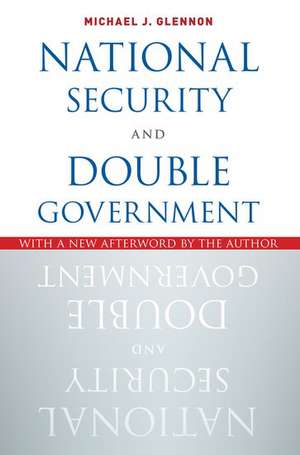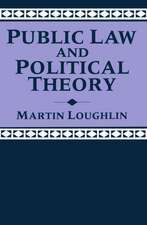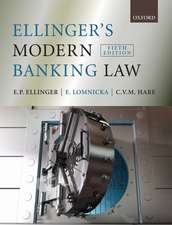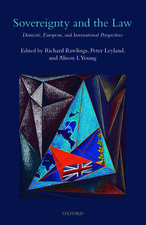National Security and Double Government
Autor Michael J. Glennonen Limba Engleză Paperback – 19 ian 2017
| Toate formatele și edițiile | Preț | Express |
|---|---|---|
| Paperback (1) | 134.73 lei 31-37 zile | +59.02 lei 6-12 zile |
| Oxford University Press – 19 ian 2017 | 134.73 lei 31-37 zile | +59.02 lei 6-12 zile |
| Hardback (1) | 305.98 lei 31-37 zile | |
| Oxford University Press – 6 noi 2014 | 305.98 lei 31-37 zile |
Preț: 134.73 lei
Preț vechi: 160.70 lei
-16% Nou
Puncte Express: 202
Preț estimativ în valută:
25.78€ • 26.99$ • 21.46£
25.78€ • 26.99$ • 21.46£
Carte tipărită la comandă
Livrare economică 19-25 martie
Livrare express 22-28 februarie pentru 69.01 lei
Preluare comenzi: 021 569.72.76
Specificații
ISBN-13: 9780190663995
ISBN-10: 0190663995
Pagini: 312
Dimensiuni: 137 x 206 x 18 mm
Greutate: 0.38 kg
Editura: Oxford University Press
Colecția OUP USA
Locul publicării:New York, United States
ISBN-10: 0190663995
Pagini: 312
Dimensiuni: 137 x 206 x 18 mm
Greutate: 0.38 kg
Editura: Oxford University Press
Colecția OUP USA
Locul publicării:New York, United States
Recenzii
Michael Glennon's book is important precisely because it pulls back the curtain to reveal the realities of the largely unconstrained U.S. national security state. In doing so, Glennon's analysis shows how the national security apparatus is a threat to the very freedoms its inhabitants and supporters purport to protect.
To Michael J Glennon, in National Security and Double Government, . . . no matter who is elected to run White House and Congress, they are puppets of a permanent apparatus. In less capable hands, Glennon's thesis might come across as sophomoric. Yet as a scholar who worked on Capitol Hill for years, Glennon is that rare thing: an academic with real world experience. Instead of a rupture between George W Bush and Obama, Glennon sees remarkable continuity. Towards the end of his presidency, Bush was asked what most surprised him about the job. 'How little authority I have,' he said. That is also what people say about Obama." -Edward Luce, Financial Times
Mr. Glennon smartly points out that while lawmakers aren't experts in social policy, education, economics and countless other areas subject to legislation, it is only in the realm of national security and intelligence that they surrender the reins of power. This is a powerful part of his argument: The lack of oversight means there is neither check nor balance on how our national-security policies are implemented or on how they are created in the first place." -Ali Soufan, The Wall Street Journal
Glennon's book is not a breezy read: It's thick with fact and not unappreciative of conundrum. Nor is he glib with proposed solutions: to adequately respond to the threats posed by a below-the-radar second government will require. But if Glennon's book is enlightening it is also scary. And it's not fiction." -Mickey Edwards, The Boston Globe
Glennon has written a unique book that stands out among the collection of post-9/11 works for the way it lashes historical trends to the most contemporary problems of government secrecy, power and overreach in a highly readable way. I underlined passages on just about every page and can't wait to reread it. The 'ah ha!' moments are endless." -Dana Priest, The Washington Post
Glennon's argument is powerful and troubling. Whatever the exact diagnosis of a problem that is clearly multidimensional, Glennon is devastating in his critique of Congressional weakness in checking Executive actions and overseeing military and intelligence agencies. Whether or not it helps resuscitate American democracy or serves as an autopsy on its demise, Double Government is essential reading." - Clifford Bob, New Rambler
If constitutional government is to endure in the United States, Americans must confront the fundamental challenges presented by this chilling analysis of the national security state." -Bruce Ackerman, Yale University
Shrewdly updating Walter Bagehot's theory of 'double government,' Michael Glennon shows how present-day Washington really works. In our faux democracy, those we elect to govern serve largely ornamental purposes, while those who actually wield power, especially in the realm of national security, do so chiefly with an eye toward preserving their status and prerogatives. Read this incisive and richly documented book, and you'll understand why." -Andrew J. Bacevich, Boston University
Taking a leaf from Walter Bagehot's thesis of dual government in Britain, Michael Glennon has transported the concept of 'double government' to the United States analyzing the constitutional institutions, or what he calls the 'Madisonian' side; and a cohort of several hundred senior military, diplomatic, and intelligence officials who run the daily business of national security, or what he calls the 'Trumanite' side. This explains the relatively little difference between the Bush 43 and the Obama presidencies. In this brilliant, deeply researched book, Glennon spells out the relation of his overall thesis to contemporary issues such as the Snowden revelations." -Charles G. Cogan, Harvard Kennedy School
His answer is altogether darker and more radical than you'd reasonably expect from a former Senate Foreign Relations Committee legal counsel and current international law professor at Tufts. Glennon argues, in essence, that the national security state has become a runaway train and that presidential elections are contests that determine who gets to pretend he's driving." -Gene Healy, Cato Institute
Michael Glennon has written a brilliant book that helps explain why U.S. foreign policy changes so little over time, despite frequent failure. Barack Obama certainly promised to fundamentally alter America's approach to the world, but little changed after he took office. Glennon shows how the underlying national security bureaucracy in Washington - what might be called the deep state - ensures that presidents and their successors act on the world stage like Tweedledee and Tweedledum." -John J. Mearsheimer, University of Chicago
In this timely book Michael Glennon provides a compelling argument that America's national security policy is growing outside the bounds of existing government institutions. This is at once a constitutional challenge, but is also a case study in how national security can change government institutions, create new ones, and, in effect, stand-up a parallel state. This is a well-argued book of academic import and policy relevance. It is recommended reading for an informed debate on an issue of great significance." -Vali Nasr, Johns Hopkins University's School of Advanced International Studies
National Security and Double Government is an important and insightful book. It should be read by anyone concerned that Obama's national security policies differ so little from those of the Bush Administration, and by every in-coming President and her staff." -Morton H. Halperin, Senior Advisor, Open Society Foundations
Michael Glennon's National Security and Double Government explains why U.S. foreign policy is prone to recurring failure and resistant to genuine reform. Instead of being responsive to citizens or subject to effective checks and balances, U.S. national security policy is in fact conducted by a shadow government of bureaucrats and a supporting network of think tanks, media insiders, and ambitious policy wonks. Presidents may come and go, but the permanent national security establishment inevitably defeats their efforts to chart a new course. Gracefully written and extensively researched, this book is the most penetrating analysis of U.S. foreign policy that I have read in years." -Stephen M. Walt, Harvard Kennedy School
National Security and Double Government is brilliant, deep, sad, and vastly learned across multiple fields
My favorite nonfiction book this year is National Security and Double Government by Michael J. Glennon, which argues that the president and Congress are largely figureheads in setting U.S. national security policy." -Tom Jackson, Sandusky Register
In his provocative new book, National Security and Double Government, he [Glennon] analyzes political developments after World War II that should be of great interest to those who follow constitutional law." -Lou Fisher, The Federal Lawyer
National Security and Double Government is a well-written and researched work. The author eloquently states his case with support from numerous examples, quotes, and case studies from past political, military, and judicial personnel. Overall, this book provides an important and timely contribution to the current political discourse." -George Washington International Law Review
Michael Glennon is a respected scholar; his book is objective and nonideological; and his contentions and conclusions are carefully documented and corroborated." -David S. D'Amato, The Future of Freedom Foundation
It is refreshing to read a book or article that avoids optimistic but unachievable normative proposals. Glennon's book neatly captures a real phenomenon in the national security arena: executive-branch experts have significant, and sometimes unchecked, power to make critical policy decisions that are hard to unwind."-AJIL, Ashley Deeks, University of Virginia School of Law
To Michael J Glennon, in National Security and Double Government, . . . no matter who is elected to run White House and Congress, they are puppets of a permanent apparatus. In less capable hands, Glennon's thesis might come across as sophomoric. Yet as a scholar who worked on Capitol Hill for years, Glennon is that rare thing: an academic with real world experience. Instead of a rupture between George W Bush and Obama, Glennon sees remarkable continuity. Towards the end of his presidency, Bush was asked what most surprised him about the job. 'How little authority I have,' he said. That is also what people say about Obama." -Edward Luce, Financial Times
Mr. Glennon smartly points out that while lawmakers aren't experts in social policy, education, economics and countless other areas subject to legislation, it is only in the realm of national security and intelligence that they surrender the reins of power. This is a powerful part of his argument: The lack of oversight means there is neither check nor balance on how our national-security policies are implemented or on how they are created in the first place." -Ali Soufan, The Wall Street Journal
Glennon's book is not a breezy read: It's thick with fact and not unappreciative of conundrum. Nor is he glib with proposed solutions: to adequately respond to the threats posed by a below-the-radar second government will require. But if Glennon's book is enlightening it is also scary. And it's not fiction." -Mickey Edwards, The Boston Globe
Glennon has written a unique book that stands out among the collection of post-9/11 works for the way it lashes historical trends to the most contemporary problems of government secrecy, power and overreach in a highly readable way. I underlined passages on just about every page and can't wait to reread it. The 'ah ha!' moments are endless." -Dana Priest, The Washington Post
Glennon's argument is powerful and troubling. Whatever the exact diagnosis of a problem that is clearly multidimensional, Glennon is devastating in his critique of Congressional weakness in checking Executive actions and overseeing military and intelligence agencies. Whether or not it helps resuscitate American democracy or serves as an autopsy on its demise, Double Government is essential reading." - Clifford Bob, New Rambler
If constitutional government is to endure in the United States, Americans must confront the fundamental challenges presented by this chilling analysis of the national security state." -Bruce Ackerman, Yale University
Shrewdly updating Walter Bagehot's theory of 'double government,' Michael Glennon shows how present-day Washington really works. In our faux democracy, those we elect to govern serve largely ornamental purposes, while those who actually wield power, especially in the realm of national security, do so chiefly with an eye toward preserving their status and prerogatives. Read this incisive and richly documented book, and you'll understand why." -Andrew J. Bacevich, Boston University
Taking a leaf from Walter Bagehot's thesis of dual government in Britain, Michael Glennon has transported the concept of 'double government' to the United States analyzing the constitutional institutions, or what he calls the 'Madisonian' side; and a cohort of several hundred senior military, diplomatic, and intelligence officials who run the daily business of national security, or what he calls the 'Trumanite' side. This explains the relatively little difference between the Bush 43 and the Obama presidencies. In this brilliant, deeply researched book, Glennon spells out the relation of his overall thesis to contemporary issues such as the Snowden revelations." -Charles G. Cogan, Harvard Kennedy School
His answer is altogether darker and more radical than you'd reasonably expect from a former Senate Foreign Relations Committee legal counsel and current international law professor at Tufts. Glennon argues, in essence, that the national security state has become a runaway train and that presidential elections are contests that determine who gets to pretend he's driving." -Gene Healy, Cato Institute
Michael Glennon has written a brilliant book that helps explain why U.S. foreign policy changes so little over time, despite frequent failure. Barack Obama certainly promised to fundamentally alter America's approach to the world, but little changed after he took office. Glennon shows how the underlying national security bureaucracy in Washington - what might be called the deep state - ensures that presidents and their successors act on the world stage like Tweedledee and Tweedledum." -John J. Mearsheimer, University of Chicago
In this timely book Michael Glennon provides a compelling argument that America's national security policy is growing outside the bounds of existing government institutions. This is at once a constitutional challenge, but is also a case study in how national security can change government institutions, create new ones, and, in effect, stand-up a parallel state. This is a well-argued book of academic import and policy relevance. It is recommended reading for an informed debate on an issue of great significance." -Vali Nasr, Johns Hopkins University's School of Advanced International Studies
National Security and Double Government is an important and insightful book. It should be read by anyone concerned that Obama's national security policies differ so little from those of the Bush Administration, and by every in-coming President and her staff." -Morton H. Halperin, Senior Advisor, Open Society Foundations
Michael Glennon's National Security and Double Government explains why U.S. foreign policy is prone to recurring failure and resistant to genuine reform. Instead of being responsive to citizens or subject to effective checks and balances, U.S. national security policy is in fact conducted by a shadow government of bureaucrats and a supporting network of think tanks, media insiders, and ambitious policy wonks. Presidents may come and go, but the permanent national security establishment inevitably defeats their efforts to chart a new course. Gracefully written and extensively researched, this book is the most penetrating analysis of U.S. foreign policy that I have read in years." -Stephen M. Walt, Harvard Kennedy School
National Security and Double Government is brilliant, deep, sad, and vastly learned across multiple fields
My favorite nonfiction book this year is National Security and Double Government by Michael J. Glennon, which argues that the president and Congress are largely figureheads in setting U.S. national security policy." -Tom Jackson, Sandusky Register
In his provocative new book, National Security and Double Government, he [Glennon] analyzes political developments after World War II that should be of great interest to those who follow constitutional law." -Lou Fisher, The Federal Lawyer
National Security and Double Government is a well-written and researched work. The author eloquently states his case with support from numerous examples, quotes, and case studies from past political, military, and judicial personnel. Overall, this book provides an important and timely contribution to the current political discourse." -George Washington International Law Review
Michael Glennon is a respected scholar; his book is objective and nonideological; and his contentions and conclusions are carefully documented and corroborated." -David S. D'Amato, The Future of Freedom Foundation
It is refreshing to read a book or article that avoids optimistic but unachievable normative proposals. Glennon's book neatly captures a real phenomenon in the national security arena: executive-branch experts have significant, and sometimes unchecked, power to make critical policy decisions that are hard to unwind."-AJIL, Ashley Deeks, University of Virginia School of Law
Notă biografică
Michael J. Glennon is Professor of International Law at the Fletcher School of Law and Diplomacy, Tufts University. Before going into teaching, he was the Legal Counsel to the Senate Foreign Relations Committee. He co-authored Foreign Affairs Federalism: The Myth of National Exclusivity (with Robert D. Sloane, Oxford, 2016). He also co-authored Foreign Relations and National Security Law, and he is the author of Constitutional Diplomacy, among other books. His op-ed pieces have appeared in the New York Times, Washington Post, Los Angeles Times, International Herald-Tribune, Financial Times, and Frankfurt Allgemeine Zeitung. He lives in Concord, Massachusetts, with his wife and son.











